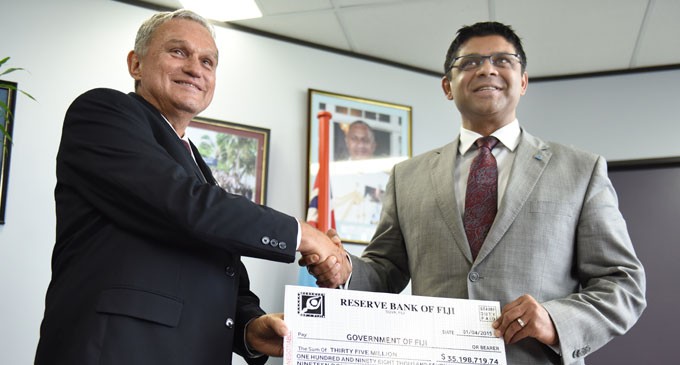"And to be fair to my friends at the RBF, we all know who the real thief is, don’t we, the one annually receiving a nice fat cheque from the RBF"

You would not think that it would “steal” money from the public.
But it does, in a petty way (this article) and in a big way (another article).
To be really accurate and fair, in both, it is merely an accessory to a crime, not the real thief.
The petty crime
Not too long ago, one of the senior managers of the Reserve Bank of Fiji, an economist by training, “reassured” the Fiji public that they could bring their old Fiji coins to the RBF Head building in Suva, and receive new coins in return.
There were no public comments from anyone, although sensible market vendors stopped accepting the old currency for their piles of beans or baigan, to the irritation of many shoppers holding the old coins.
How fair and sensible was the RBF announcement, which drew no comments from the Commerce Commission or the Consumer Council of Fiji?
Why should the holder of old Fiji currency pay for the cost of transport and waste his or her valuable time to get back the same face value of the currency?
If I publicly threatened and extorted 50 cents from you, I would be promptly and rightly prosecuted, fined some moderate amount, and if the magistrate wanted to make an example of me, I would be jailed for a few months, to discourage others from committing the same crime.
But apparently, Reserve Banks can “steal” a portion of your wealth in clear public view, with no public comment whatsoever, no policeman prosecuting them, as they have done previously also with old Fiji notes.
Even more ridiculous was a recent case of the Central Bank of Samoa, refusing to redeem in Samoa, old Samoan bank notes.
What is money?
The senior bank manager who made the announcement is an economics graduate who ought to understand the fundamentals origins of “money” and the sacred “contract” it embodies.
There are many fascinating historical origins of money the world over- as salt, cowries, tobacco, pieces of iron, copper, silver, gold, and in the Pacific, shells, stone wheels, and whales’ teeth (tabua).
Historians and anthropologists argue that these monies were used not as a means of exchange, but as tribute or offerings to rulers, priests and anyone to whom people had social obligations such as during births, marriages, funerals, and even to atone for crimes committed thereby discouraging “payback crimes” (as in PNG).
For economics textbooks, however, money is explained as a mechanism to facilitate exchange in the economy, as a universally accepted means of payment, for goods or services, replacing the inefficient barter in primitive times.
Today, modern money is “fiat” money guaranteed by the state, the government, the central bank or reserve bank.
Behind every unit of money, note or coin or electronic record, is a sacred contract, which the RBF should think about.
Every single unit of money represents real goods or services already produced to the face value of that money, and the holder of that money is entitled to receive exactly the same value in return.
That money (note or coin) issued by the RBF must, by law, be universally accepted in payment for exactly that face value, not a cent less.
To then tell the holder of that old currency, say in Savusavu, that you cannot use it any more in Savusavu, but you must now take that old currency to the RBF office in Suva, and obtain exactly the same amount in new currency, is ridiculous.
The RBF is forcing the holder of the old currency, to lose the original value, by the cost of transport, and the value of his time wasted in exchanging the new currency.
Some holders will reluctantly do so if they have large amounts of old currency, and just put up with the costs.
But many simply could not be bothered and the old coins and notes, lie in their possession unused and unusable, having totally lost value, with their holders, in effect, swindled by decree, out of whatever value they gave originally, for that money.
But the RBF is not being prosecuted by any DPP or policeman, and the Central Police Station is just across the road from the RBF building.
No magistrate is fining them or sending them to jail for this daylight robbery.
Where you may ask, is the otherwise ever present and ever pugnacious Consumer Council of Fiji or the Commerce Commission CEO (rather reticent now their Executive Chairman has moved on to greener pastures)?
But another Central Bank in the Pacific really takes the cake.
Robbery by Central Bank of Samoa
Not too long ago, a Confucius Institute group from USP in Fiji went to Samoa, and some sensibly (or so they thought) bought Samoan currency notes from one of the expatriate banks in Fiji.
But they had “not banked” (ha ha) on shops in Samoa not accepting the old Samoan notes: old was not gold.
Then to their amazement, even the commercial banks in Samoa would not accept the old Samoan currency notes.
And then to their utter shock and disbelief, even the Central Bank of Samoa in Apia, refused to redeem the old Samoan notes.
I suspect that had the holders of that old Samoan currency burnt one of the notes in the presence of the Governor of the Central Bank of Samoa, they would have been charged, fined and jailed, under some obscure Samoan law, for “defacing and destroying Samoan Government property” which they now did not want to admit ownership of.
The Fiji group was cynically told to take the old notes back to whoever had sold them in Fiji.
Which they meekly and mildly did, being peaceful law-abiding citizens, although they might easily have berated this bank for giving them the old Samoan notes in the first place.
You can bet your bottom dollar (not Samoan obviously) that the giant multinational Australian bank in Fiji would have had no trouble getting their Samoan currency redeemed by the Central Bank of Samoa (albeit with more expense along the way).
Where is the RBF common sense?
Common sense suggests that the RBF should not set any time limits to the acceptance of any currency they issue.
All traders must be required to accept all Fiji currency, which most would eventually deposit with the banks, who could, in the normal course of their business, eventually exchange them at the RBF for new currency.
Why did the RBF ever allow commercial banks to refuse to accept old coins and notes?
Commercial banks in Fiji make massive profits from the hundreds of millions of savings deposits which annually lose a large part of their value to inflation.
Was it too much for them to provide this basic service to the holders of old currency, not as a favor, but a legal liability?
Some might ask me, why make such a big thing out of a few coins or notes, worth a few dollars?
Steal a dollar today, a million tomorrow
I suggest that if the RBF ignores basic principles over a few dollars, it will also ignore them for a few million dollars.
The bigger crime, involving an open annual robbery of tens of millions, where the victim never complains to the police, is the subject of the next article.
And to be fair to my friends at the RBF, we all know who the real thief is, don’t we, the one annually receiving a nice fat cheque from the RBF.
The next article explains why lots of robberies, amounting to millions, are taking place, with nobody being charged.





